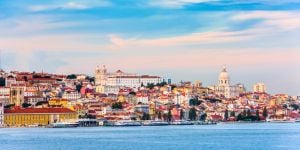Portuguese Citizenship: Who is entitled and how to obtain it?
Last activity 05 October 2024 by JohnnyPT
11441 Views
58 replies
Subscribe to the topic
Post new topic
Warning: This may be out of date. There have been changes to nationality law since 2020/2021.
Portuguese Citizenship: Who is entitled and how to obtain it?
Most of recent amendments (in force since 11 November 2020) are already included here. They were made to make this law more comprehensive and inclusive).
Diário da República / Laws Journal (2020-11-10)
https://dre.pt/home/-/dre/148086464/details/maximized
Portuguese citizenship may be acquired in two ways:
- by ORIGINAL ATTRIBUTION: is an original nationality which takes effect from the date of birth of the applicant. Therefore, once the applicant has the nationality, he can pass this right on to his children, whether they are over or under the age of majority.
- by ACQUISITION: it takes effect only from the date on which the acquisition of nationality is drawn up.
_____________
Main topics being considered here:
A. Portuguese Citizenship by ORIGINAL ATTRIBUTION
B. Portuguese citizenship by ACQUISITION / "Naturalisation"
C. Portuguese Citizenship for Grandchildren with ORIGINAL ATTRIBUTION
D. Effective links with the Portuguese Community
E. Steps to be followed when applying portuguese nationality and FAQs
Who is entitled to Portuguese citizenship?
- Child of a Portuguese citizen (A1)
- Grandchild of a Portuguese citizen (A2, A3, C1, C2)
- Great-grandchild of a Portuguese citizen (A4)
- Married or in a stable union with a Portuguese citizen (B1, B2)
- Descendants of Portuguese Sephardic Jews (B3)
- Child (born in Portugal) of foreign citizens (A5) ---- Out of date. See post #57
- Born in a former Portuguese colony, but when it was still under the control of Portugal (B6)
- Legally resident in Portuguese territory for more than 5 years (B5)
- Foreign children adopted entirely by Portuguese citizens;
- Minor/Adult born in Portugal with foreign parents (B4)
- Re-Acquisition of Portuguese nationality (B7)
A. Portuguese Citizenship by ORIGINAL ATTRIBUTION
A1. Child of a Portuguese citizen
In this case, the father, the mother or both:
- must have been born in Portugal, or
- acquired Portuguese citizenship because they are also children of a Portuguese citizen.
A2. Grandchild of a Portuguese citizen
Portuguese grandchildren are entitled to obtain Portuguese citizenship, but each case has a different procedure:
- If the applicant's parents have died without having acquired Portuguese citizenship (or they are alive and do not want/may not acquire Portuguese nationality) and the applicant is a grandchild of a Portuguese citizen, he or she is entitled to obtain citizenship by ATTRIBUTION (see details in section C.)
- If the parents are still alive and the applicant is the grandchild of a Portuguese citizen, he/she is entitled to obtain Portuguese citizenship by ATTRIBUTION: First the child of the Portuguese citizen must acquire Portuguese citizenship and then obtain the right to Portuguese citizenship as the child of the Portuguese citizen.
A3. Conversion of Portuguese Citizenship for Naturalised Grandchild
Until June 2017, grandchildren could only obtain Portuguese nationality by ACQUISITION / "Naturalisation" (under Article 6, No. 4 of the Nationality Act, which has since been revoked).
Since that date, with the entry into force of the amendment to the Nationality Law, grandchildren may obtain nationality by ATTRIBUTION.
This means, in a very simplistic way, that previously naturalised grandchildren could not pass on the nationality to their descendants, but now, after the "conversion" of the nationality of naturalisation by ATTRIBUTION, this becomes possible.
And with the advantage that, unlike what is required of grandchildren who now obtain nationality for the first time, those who were already Portuguese under the previous law do not need to prove the existence of an effective connection with Portugal (details in D.).
A4. Great-grandchild of a Portuguese citizen
To obtain Portuguese citizenship as a great-grandchild, there is one condition that must be met.
The scenario also provided for in Decree-Law 71/2017 , shows that the status of application will depend on who is alive in the family, because you cannot "skip" two generations.
In other words, it is necessary for the father or mother or grandchild of the Portuguese to acquire Portuguese citizenship, and then to pass it on to the next generation, as a child, to the great-grandchild of the Portuguese citizen.
In the same way, the link with the Portuguese community must be proven (see point D.).
Another hypothesis, for the great-grandson to acquire Portuguese citizenship, is whether all the ancestors are still alive. In other words, by attributing the citizenship to all of them, this process is more guaranteed, as it is an acquired right.
A5. Child (born in Portugal) of foreign citizens
Out of date. See post #57
B. Portuguese citizenship by ACQUISITION / "Naturalisation"
B1. Married or in a stable union with Portuguese citizen
NEW Amendment (11 November 2020):
To be eligible for Portuguese citizenship, you must be married for at least three years with a Portuguese citizen, with or without children in common.
B2. Married to a Portuguese citizen (before 1981)
In this case, the foreign woman must have married a native Portuguese citizen, i.e. she must not have been naturalised before 3 October 1981.
She is therefore entitled to Portuguese nationality, unless, until the marriage she declares that she does not wish to acquire it and proves that she does not lose her previous nationality. This type of Portuguese citizenship may be requested by wives, including widows.
B3. Descendants of Portuguese Sephardic Jews
This is only valid until the end of 2023.
Portuguese citizenship is authorised by demonstrating the tradition of belonging to a Sephardic community of Portuguese origin (back to 15 century). After that, it can occur on the basis of proven objective requirements of connection to Portugal.
In other words, the following criteria may help: surname, family language, direct or collateral ancestry, provided they are older or emancipated under Portuguese law.
As in other cases of application for nationality, the applicant is also required to prove a link with Portugal (see point D.).
B4. Born in Portugal with foreign parents
If the applicant was born in Portugal with foreign parents and is a foreigner:
B4a. Minor
NEW Amendment (11 November 2020): Minors, born in Portugal and children of foreigners, may now acquire Portuguese nationality by ACQUISITION, provided that at least one of their parents is a legal resident in Portugal at the time of application.
B4b. Adulthood
Those who have habitually lived in Portugal for at least 10 years at the time of applying for Portuguese nationality, have not resided elsewhere and have foreign parents (with or without legal residence on Portuguese territory), are entitled to apply for Portuguese nationality by ACQUISITION.
This process applies to those who do not have and/or have had a valid residence permit, but who have resided in Portugal for 10 years without interruption.
B5. Portuguese citizenship by duration of residence
Foreigners who have lived legally in Portugal for at least 5 years are entitled to apply for Portuguese citizenship for a period of legal residence. They must have a valid residence permit and accumulate at least 5 years of legal residence at the time of application. These 5 years of residence may be followed or interspersed.
B6. Born in a former Portuguese colony
A person born in a former Portuguese colony (Angola, Mozambique, São Tomé and Príncipe, Cape Verde, Guinea-Bissau) can obtain Portuguese citizenship, but only when he or she still belonged to Portugal.
To apply, it is necessary to be the child or grandchild of a Portuguese citizen, and to have been born before the proclamation of independence of that former colony, i.e. while that country still belonged to Portugal.
B7. Re-Acquisition of Portuguese nationality
This case occurs when the citizen loses Portuguese nationality (when the law does not allow to have both nationalities at the same time) and intends to reacquire it.
Those who were once Portuguese can become Portuguese again in the following cases:
B7a.Never acquired another nationality:
If you are no longer Portuguese and have never acquired any other nationality you can return to being Portuguese as long as you are over 18 years of age, i.e. emancipated under Portuguese law, and you have not been convicted of a crime punishable in Portugal with 3 years or more of imprisonment and you cannot be involved in activities related to terrorism.
B7b.Opted for another nationality:
If you stopped being Portuguese because you opted for a foreign nationality before 03/10/1981 you can go back to being Portuguese if you declare that you want to.
B7c. Lost nationality when minor or incapacitated:
If you ceased to be Portuguese at the request of your representative, when you were a minor or incapacitated, you can again prove an effective link to the Portuguese community and declare that you so wish.
B7d.Woman who ceased to be Portuguese in marriage:
A woman who lost Portuguese nationality because she married a foreigner before 1981 simply declares that she wants to re-acquire Portuguese nationality.
B7e. In all other cases:
The case can be brought by the prosecutor himself or by any Portuguese consulate. The prosecutor may be a lawyer or someone you can trust.
______________________________
For all the previous cases (B1 to B7), Portuguese nationality is granted, by ACQUISITION, to foreigners who meet all the following requirements:
a) They must be of majority or emancipated under Portuguese law;
b) They are legally resident in Portuguese territory;
c) They have sufficient knowledge of the Portuguese language;
d) They have not been convicted of a crime punishable under Portuguese law, with a sentence of imprisonment of 3 years or more;
e) They do not represent a danger or threat to national security or defense for their involvement in activities related to the practice of terrorism.
C. Portuguese Citizenship for Grandchildren with ORIGINAL ATTRIBUTION
The grandchildren of Portuguese citizens have the right to Portuguese citizenship:
C1.If your parents have died without having acquired Portuguese citizenship (or they are alive and do not want/may not acquire Portuguese nationality) and you are the grandchild of a Portuguese citizen, you are entitled to obtain citizenship by ATTRIBUTION.
NEW Amendment (11 November 2020):
Under this new version of the Nationality Law now in force, foreign citizens who are grandchildren of Portuguese citizens may now be granted Portuguese nationality provided that they prove only
(i) sufficient knowledge of the Portuguese language (which is presumed to exist for nationals of Portuguese-speaking countries) and
(ii) that they have not been sentenced to imprisonment of 3 years or more for a crime punishable under Portuguese law.
According to the previous law:
- for grandchildren of citizens of Portuguese nationality were required, in addition to the above requirements, to prove regular contact with the Portuguese territory (namely regular travel and/or actual residence in Portugal and participation in Portuguese cultural associations in the country of origin), (point D.). Now such proof is now no longer necessary, providing that (i) and (ii) are met.
C2.If your parents are alive and you are the grandchild of a Portuguese citizen, you are entitled to acquire Portuguese citizenship by ATTRIBUTION. This means that first the child or children of the Portuguese must acquire Portuguese citizenship and then the right as a child of Portuguese citizens is obtained.
D. Effective links with the Portuguese Community
One of the most sensitive and controversial issues in the Portuguese nationality law (2017 amendments) concerns the so-called "effective links with the Portuguese community". These requirements are no longer necessary for grandchildren (see C1).
This is a requirement present in some cases of application for Portuguese citizenship, especially in the current application for:
- the attribution of nationality by a grandson of Portuguese (only in some cases),
- the application for the acquisition of nationality by descendants of Portuguese Sephardic Jews
Lack of proof of which (generally) leads to the rejection of the application.
Based on the practical experience of the Portuguese Civil Registry offices, as well as on the analysis of the relevant case law, it is highlighted below "some" of the elements and documents that may serve to prove such ties of effective connection to the portuguese community:
- Authorisation/visa for residence in Portugal;
- Proof of rental or purchase of property in Portugal;
- Tax Identification Number;
- Social Security Registration;
- NHS's Registration (National Health System);
- IRS / Tax Declaration;
- Portuguese bank account;
- Business created in Portugal;
- Participation in events, fairs, congresses in Portugal;
- Proof of regular travels to Portugal;
- Proof of relationship with the Portuguese associations in the country where the applicant was born
- Statements from Portuguese friends and relatives;
- Services provided to any Portuguese institutions.
Based on the "subjective" analysis of the documents submitted, if the Civil Registry considers that the applicant does not have effective ties with the Portuguese community, Civil Registry Office will communicate this fact to the Portuguese Public Prosecutor's Office, which will issue an Opposition Court Action to the Portuguese Nationality, so that the application will be rejected.
E. Frequented Asked Questions (FAQs)
E1. Attribution vs acquisition, Loss of Portuguese citizenship. Where can you apply?...
https://portaldascomunidades.mne.gov.pt … ionalidade
____
E2. The application process for nationality has eight stages.
https://justica.gov.pt/en-gb/Servicos/E … ionalidade
1. the conservatory office receives the request;
2. the application is registered in the system of the Institute of Registration and Notary Affairs (IRN);
https://irn.justica.gov.pt/
3. It checks that all the necessary documents have been delivered;
4. It checks that all documents delivered meet the legal requirements;
5. For some types of requests other entities are consulted to verify that the person making the request has no relevant criminal record;
6. it is verified that all the necessary conditions to grant the nationality are met;
7. it is decided if the person is entitled to Portuguese nationality;
8. The new Portuguese Citizen is registered in the Civil Registry of Portugal.
____
E3. How to check the status of the nationality process?
The status of an application for Portuguese nationality can be consulted online, without having to go to a civil conservatory office.
https://justica.gov.pt/en-gb/Servicos/E … ionalidade
(...)
Post #6: the link under review in E1, is
https://portaldascomunidades.mne.gov.pt … portuguesa
eportugal.gov.pt
Portuguese Gov. website to access useful public services
To find out more about the conditions for applying for Portuguese Nationality, i.e.,
- What are the conditions?
- Which required documents?
- Where to request?
- How much does it cost?
please choose the option that applies to your case.
Note: Some inconsistencies are likely to be found due to some recent changes of the Nationality Law (November 2020), which are not yet considered in some of these links (i.e. page content versus title)
https://eportugal.gov.pt/en/servicos/pe … portuguesa
Born in Portugal, when your parents lived in Portugal, and you have usually lived in the country for at least 5 years (B4b)
https://justica.gov.pt/Como-obter-nacio … os-10-anos
Born in Portugal, registered after 6 July 2018 and one of your parents has been legally living in Portugal for at least 2 years (A5)
https://justica.gov.pt/Como-obter-nacio … nos-5-anos
Born abroad, but married or living in a non-marital partnership with a Portuguese citizen for more than 3 years (B1)
https://justica.gov.pt/Como-obter-nacio … econhecida
Born abroad but legally resident in Portugal for at least 5 years (B5)
https://justica.gov.pt/Como-obter-nacio … nos-6-anos
Born abroad, but child of a Portuguese citizen (A1)
https://justica.gov.pt/Como-obter-nacio … -portugues
Born abroad, but grandchild of a Portuguese citizen (A2)(C)
https://justica.gov.pt/Como-obter-nacio … -portugues
Born abroad, but adopted by one Portuguese citizen, before your 18th birthday and before October 8, 1981 (B8)
https://justica.gov.pt/Como-obter-nacio … es-de-1981
Born abroad, but adopted by one Portuguese citizen, before your 18th birthday and after October 8, 1981 (B8)
https://justica.gov.pt/Como-obter-nacio … is-de-1981
You ceased to be a Portuguese national and never obtained another nationality (B7a)
https://justica.gov.pt/Como-obter-nacio … ionalidade
You ceased to be a Portuguese national and you have opted for another nationality (B7b)
https://justica.gov.pt/Como-obter-nacio … strangeira
You ceased to be a Portuguese national when you were a minor or incapacitated, by decision of your legal representative (B7c)
https://justica.gov.pt/Como-obter-nacio … resentante
You ceased to be a Portuguese national because you have married a foreign man before 1981 (B7d)
https://justica.gov.pt/Como-obter-nacio … es-de-1981
You are under 18 or incapacitated and, when you were born, your mother or father were not yet Portuguese nationals (B4a)
https://justica.gov.pt/Como-obter-nacio … portuguesa
You belong to a Portuguese community abroad (D)
https://justica.gov.pt/Como-obter-nacio … strangeiro
You have provided relevant services to the Portuguese State or the Portuguese community (D)
https://justica.gov.pt/Como-obter-nacio … portuguesa
You are descended from Portuguese Sephardic Jews (B3)
https://justica.gov.pt/Como-obter-nacio … ortugueses
______________________________________
The last amendment to the Portuguese Nationality Law was released on 10 November 2020:
https://irn.justica.gov.pt/Noticias-do- … portuguesa
Portuguese Passport related services
If you are a Portuguese citizen and you are travelling outside the European Union and the Schengen area, then you will need a passport, currently called e-passport (passaporte eletrónico).
How to request the Portuguese passport in Portugal and abroad:
Who can request it? Where to apply? How to apply? How much does it cost?
https://eportugal.gov.pt/en/servicos/pe … -portugueshttps://justica.gov.pt/Registos/Identif … eletronico
How to schedule date/time to apply for passport / pick up the passport:
(Agendamento para requerer/levantar o passaporte)
Set a date and time to request or pick up your Portuguese passport.
Avoid waiting queues and time losses. The scheduling is free of charge and it may be carried out online.
https://eportugal.gov.pt/en/servicos/ag … passaportehttps://justica.gov.pt/Servicos/Agendar … passaporte
How to request the replacement of the Portuguese Passport:
(Renovação/Substituição do passaporte)
https://eportugal.gov.pt/en/servicos/pe … -portugues
How to issue the Portuguese Passport from abroad:
(Emissão do passaporte fora de Portugal)
https://eportugal.gov.pt/en/servicos/em … strangeiro
The Portuguese language test CIPLE (Certificado Inicial de Português como Língua Estrangeira / Initial Certificate of Portuguese as a Foreign Language) is a mandatory language test for obtaining Portuguese citizenship (see previous posts in this topic).
In accordance with current legislation, level A2 is the minimum level required. This level is around that of O-Level/GCSE in the UK.
You can do this exam only in an accredited centre for evaluating the knowledge of Portuguese as a foreign language. There are about 100 of these centres in 35 countries around the world, in all continents.
Aveiro - Universidade de Aveiro
Chaves- Escola Superior de Enfermagem Cruz Vermelha Portuguesa
Évora - Universidade de Évora
Faro - Universidade do Algarve
Funchal (Madeira) - Academia de Línguas da Madeira
Leiria - Instituto Politécnico de Leiria
Lisboa - Universidade Nova de Lisboa
Lisboa - Universidade de Lisboa
Ponta Delgada (Azores) - Universidade dos Açores
Porto - Universidade do Porto
Vilamoura (Algarve) - Colégio Internacional de Vilamoura
You will be exempt from the test if:
- You are married to a Portuguese citizen, or
- You are eligible for Portuguese citizenship through naturalization, or
- You are from a Portuguese speaking country AND you know portuguese, spoken and written, or
- You have a certificate stating that you have a higher level of Portuguese than A2 (B1, B2, C1 or C2), or
- You are over 60 years old, having a mental handicap or being illiterate
https://caple.letras.ulisboa.pt/inscricao
In jan2021, the test duration is 2 hours, and the cost is 72 €
https://caple.letras.ulisboa.pt/exame/2/ciple
https://caple.letras.ulisboa.pt/epocas
For more information about CIPLE exam, please visit the CAPLE (Centro de Avaliação Português Língua Estrangeira):
Portuguese Language Exams
CIPLE - A2
DEPLE - B1
DIPLE - B2
DAPLE - C1
DUPLE - C2
Hi Wilsonz,
The CIPLE exam, level A2 is the minimum level required to obtain Portuguese Nationality. This level is around that of O-Level/GCSE in the UK. When you get a mark of 55% or more, you will pass the exam.
PERMANENT RESIDENCE PERMIT (SEF website)
https://imigrante.sef.pt/en/solicitar/residir/art80/
I'm not sure I understand the difference between Permanent Residence and Nationality as far as the language capability is. It looks like both require A2, although PR may not require a government supervised test. Do I have that right?
Thanks.
HaoChi
Hi HaoChi,
Permanent Residence (PR) permit is not about Portuguese Citizenship.
To apply for Portuguese Citizenship, you need to fulfil a set of criteria, mentioned above.
To apply for the permanent residence permit, here is what you need. But also in this case, you will need the Certificate of basic knowledge of Portuguese language (*).
REQUEST A PERMANENT RESIDENCE PERMIT
https://eportugal.gov.pt/en/servicos/pe … permanente
In Portuguese there is further information (*):
https://eportugal.gov.pt/pt/servicos/pe … permanente
____
(*) Comprovativo de conhecimento do português básico, mediante apresentação de:
- Certificado de habilitações emitido por estabelecimento português de ensino oficial ou de ensino particular ou cooperativo reconhecido nos termos legais ou
- Tratando-se de pessoa que tenha frequentado estabelecimento de ensino oficial ou de ensino particular ou cooperativo reconhecido nos termos legais em país de língua oficial portuguesa, mediante certificado de habilitação emitido por esse estabelecimento de ensino ou
- Certificado de aproveitamento no curso de português básico emitido pelo IEFP ou por estabelecimento de ensino oficial ou de ensino particular ou cooperativo legalmente reconhecido ou
- Certificado de conhecimento de português básico, mediante a realização de teste em Centro de Avaliação de Português como Língua Estrangeira (CAPLE), reconhecido pelo Ministério da Educação e Ciência.
https://caple.letras.ulisboa.pt/exames
Granting of Portuguese Nationality to descendents of Sepharadic Jews
https://cilisboa.org/portuguese-nationality-concession/
________________
Any further questions on this topic you can email/fill in form here:
Lisbon Jewish Community
https://cilisboa.org/cilisboa-en/
Israeli Embassy in Portugal
https://embassies.gov.il/Lisboa/AboutTh … ct-us.aspx
TRANSLATION CERTIFICATION
Many entities require a certified translation of legal documents, for example, to apply for citizenship.
Eg:
- Legal documents: criminal record certificates, powers of attorney, divorce sentences;
- Examination certificates: diplomas, driving licences;
- Notarial deeds: wills, deeds of sale, powers of attorney;
- Translations of civil registry papers: birth certificates, identity cards, citizen cards, passports, marriage certificates.
The formalities required for the official certification of a translation vary from country to country.
In Germany, France, Italy, the Netherlands, Belgium, Spain,... authorised translator takes an oath before a court. In these countries, the only way to get an officially certified translation is through a sworn translator (also called an "official translator").
In other countries, such as PORTUGAL, Switzerland, the United Kingdom and the United States, translators certify the accuracy of the translated version themselves and their technical competence in the respective languages. For this purpose, translators must apply to a public notary for certification and acknowledgement of the translator's signature (NOTORIAL AUTHENTICATION). In Portugal, since 2001 the certified translations can also be done by lawyers and solicitors.
When choosing the right translator certain criteria have to be taken into account. For example, a certified translation should preferably be done in the target country. In this way, the translation can be used directly so that you do not have to go through costly and time-consuming administrative procedures and formalities (such as obtaining an apostille or consular certification at the portuguese consulate in your country of origin).
It is also useful to search for a translator in translators associations, whose members are subject to a code of ethics, such as, for example, the APT - Portuguese Association of Translators.
APT Translators search:
https://www.apt.pt/socios/pesquisa
(You can change to english, top right corner)
You can contact the translator directly and check out details about his/her academic background.
Some translators translate to Portuguese (br). Portuguese (br) is Brazilian Portuguese.
You must choose one who translates to portuguese, not portuguese (br).
The code of ethics by which the APT is governed is as follows:
https://www.apt.pt/detalhe/825
Translation certification & portuguese laws:
https://www.apt.pt/detalhe/879
Solicitors, Lawyers & Notaries in Portugal:
https://www.expat.com/forum/viewtopic.php?id=941009
If I study A1 and A2 courses in Univeristy of Lisboa or nove lisboa will I be exempted from sitting the CIPLE exam?
I don't think so. That CIPLE exam is mandatory.
(P.s. "nove lisboa" = Universidade Nova de Lisboa)
Hi JohnnyPT,
Thanks for the comprehensive information! I have a question about the citizenship by attribution: am I to understand that my mother had to have Portuguese citizenship at the time of my birth for me to qualify? My mother joined my grandmother in the UK when she was 18 and they both took British citizenship (they were not aware dual citizenship was a thing). Even under the great-grandparent rule I would then not qualify as this would be skipping two generations? They have both since passed away.
Many thanks,
James
Hello James, Welcome 
Your case is particular, because from what you are saying both your grandmother and mother lost their Portuguese nationality because the UK does not allow dual nationality? Are you sure about that?
I suggest you to look at case B7e, you may be able to prove the nationality of your ancestors and, thus, obtain Portuguese Nationality through A1 or A2. Even if they did not have Portuguese Nationality when they passed away, the birth certificates of both still exist, they were not erased... Try to get them and ask at a Portuguese Consulate in the UK how to proceed.
B7e. In all other cases:
The case can be brought by the prosecutor himself or by any Portuguese consulate. The prosecutor may be a lawyer or someone you can trust.
Kind Regards
REQUEST A BIRTH CERTIFICATE
It took nearly a year but I have received a letter from my local Consulate registering my birth in Portugal. The Consulate told me when I was applying that this would be proof of my Portuguese nationality.
I want to apply for a passport but my local Consulate is very difficult to get a hold of to ask questions and their website is very confusing.
What would be the next step to get a Portuguese passport? All I can find online is that I need a Citizen's Card to apply but having never lived in Portugal I, of course, don't have one.
Anyone recently been through this?
You can request portuguese nationality at the portuguese consulate in your area of residence.
If you have any doubts, you should ask at your consulate about the required documents. You can also find the required documents here in this thread and in these links provided. If you read carefully you will understand...
The portuguese passport and the citizen card are obtained after you have portuguese citizenship. That is, it is a consequence of that, and not a prerequisite to obtain citizenship. So, first you must apply for portuguese citizenship.
REQUEST PORTUGUESE NATIONALITY
https://eportugal.gov.pt/en/servicos/pe … portuguesa
OBTAINING PORTUGUESE NATIONALITY
My father is blind and has dementia, but my lawyer says I could not exempt him from doing the language test based on the medical reports that we have.
I just cannot believe that a person who is blind and has severe dementia cannot be exempted from the language test that is required for the citizenship.
@JohnnyPT
Thanks, I applied last year based on your advice and information and was successful in having my birth registered which conveyed nationality to me directly from my father. It was just getting the passport which was the next unclear step.
Eventually my consulate responded and they said a passport can only be obtained after you apply for your citizen card. I was able to do that through them and I obtained the card around two weeks after my appointment.
They also told me a passport was unnecessary as the citizen card works the same way and can be used in Portugal and the EU so I saved myself the money and will just keep the citizen card. Thank you for all your help!
Hi canadaportugalvisa22,
Thank you for your feedback.
________
If you have a valid Portuguese Citizen Card you can travel to the following countries without a Portuguese Passport:
○ European Union countries
○ Iceland
○ Liechtenstein
○ Norway
○ Switzerland
For UK: passport required.
- Legally resident in Portuguese territory for more than 5 years (B5)
I need more/ all details for this option..
- Legally resident in Portuguese territory for more than 5 years (B5)
I need more/ all details for this option..
-@Malik Sarfraz Ahmad
Post #8 above
Search for B5 (translation required)
You must prove that you have sufficient knowledge of Portuguese, and take the CIPLE exam.
- You are from a Portuguese speaking country
How would you prove that you're from a Portuguese speaking country. I assume you have to present documents like a birth certificate & passport, but I'm unable to verify through other blogs/official websites
I asking becasue both and my mum are the only people in my family who were born in a former Portuguese colony.
The fact that you were born in a Portuguese-speaking country doesn't mean that you can speak Portuguese, and are exempt from taking the exam.
The context of the sentence you quote here has to do with the Portuguese exam and only that.
Forget your birth certificate & passport, if you don't know Portuguese, spoken and written, it is useless in this context.
Plainly spoken is always best and in this - as opposed to the original - context essential. I heard someone remark, with no hint of irony, that Brazillian and European Portuguese would be the same ... "If only Portugal would make a little more effort. I almost asked the lady to repeat what she'd said but my jaw had dropped too far me to speak.
@JohnnyPT Thanks for the effort and details to help in obtaining citizenship. The exemptions: Can you clarify if persons over 60 are exempt the language test? Many thanks Simon
Hi Simon,
Artigo 25.º
Prova da residência e do conhecimento da língua portuguesa
6 - Tratando-se de pessoas com graves problemas de saúde ou com deficiências com grau de incapacidade devidamente comprovada por atestado médico multiuso passado nos termos da legislação portuguesa, ou de pessoas com idade igual ou superior a 60 anos que não saibam ler ou escrever, a prova do conhecimento da língua portuguesa deve ser adequada à sua capacidade para demonstrar conhecimentos desta língua.
6 - In the case of persons with serious health problems or handicaps ... or aged 60 or over who cannot read or write, the proof of knowledge of the Portuguese language shall be appropriate to their ability to demonstrate knowledge of this language.
Plainly spoken is always best and in this - as opposed to the original - context essential. I heard someone remark, with no hint of irony, that Brazillian and European Portuguese would be the same ... "If only Portugal would make a little more effort. I almost asked the lady to repeat what she'd said but my jaw had dropped too far me to speak.
-@hanibal18
The Portuguese clearly understand the Brazilians. The opposite is, unfortunately, very common. Programmes made in Portugal, such as soap operas, are dubbed into Brazilian Portuguese in Brazil (!) The opposite has never happened... since early 70s in Portugal with brazilian soap operas or other tv shows. Maybe that's the reason ? It could be, but there are also other reasons, such as the low level of education in some Brazilian states and the restricted access to information coming from outside Brazil.
I believe that children born to foreign parents who have lived in Portugal for more than a year can obtain Portuguese nationality, but can the parents use the child's nationality to obtain a residence card?
I'm currently in Portugal on a D7 visa, but I plan to move to another country in the future. We are concerned about the steps we need to take to obtain a residence card when we return to Portugal.
In this case, what steps are necessary to obtain a residence permit?
Also, is my understanding correct that if the parents have been in Portugal for more than a year at the time of the child's birth (and not at the time of the child's conception), the child can acquire Portuguese citizenship?
@JohnnyPT
Thanks for the reply.
I checked my previous posts again and could not find the answer to my question.
I know that our child can get Portuguese citizenship by A5.
I just want to check on two points,
1. can a parent of a child with Portuguese citizenship, but not nationality or citizenship, obtain a long term Portuguese residence permit, and what is the process?
2. this is just to be sure, but what I mean by parents legally residing in Portugal for more than 1 year is only if 1 year has passed when the child is born, not necessarily at the time of conception, right?
I would like to know about the above two points.
Thank you in advance.
Are you a legalised resident in Portugal for at least one year? Then A5 applies to your child, obviously from the day of birth and not from the day of conception.
Parents don't get nationality because of their child. They have to follow the normal procedure, which will be the B5, with mandatory Portuguese exam, etc...
@JohnnyPT
Thank you so much.
Yes, we intend to stay in Portugal legally for a year or more before having children.
We are not looking to obtain Portuguese citizenship but would like to stay in Portugal for the long term.
After this stay in Portugal, we will need to move to Africa for 4 years due to my husband's job.
However, we would like to make Portugal our final destination in life.
Therefore, we are concerned that after our 4 year stay in Africa, we will have to start all over again with the visa application process we went through this time. We also worry that the visa requirements have become even stricter in the last few years.
That is why I am wondering if there is any way to more easily obtain our permission to stay in Portugal due to our child's Portuguese nationality!
Articles to help you in your expat project in Portugal
 Retiring in Portugal
Retiring in PortugalOver the past few years, Portugal has become quite the popular destination for retirement, much due to its low ...
 Traveling to Portugal
Traveling to PortugalKnown for its perennial sunshine, stunning coastline and great cultural sights, Portugal welcomes over 20 million ...
 Dating in Portugal
Dating in PortugalIf it's true that dating in general can be tricky and present its challenges, even more so when we talk about ...
 The Portuguese lifestyle
The Portuguese lifestyleMoving to a new country means you will be discovering a new culture and exploring different habits, as well as a ...
 Phones and Internet in Portugal
Phones and Internet in PortugalWhether or not you are a tech-savvy person, this is still quite an important part of everyday life – and it ...
 Work visas in Portugal
Work visas in PortugalPortugal can be a great place to live in. This Southern European country is known for its great weather, ...
 Renting options in Porto
Renting options in PortoOver the past few years, rent prices in Porto have been soaring. As the city's popularity grows among tourists ...
 Working in Lisbon
Working in LisbonLisbon is Portugal's capital and also the largest city in the country. Furthermore, it is the richest ...
Find more topics on the Portugal forum



